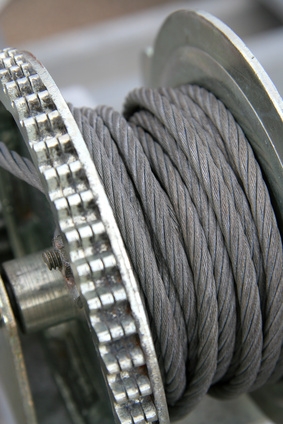
Winches are very useful and often necessary components of any vehicle being used for off-road driving, be it business or pleasure. It consists of a roll of cable with a hook on the end that can be used for towing other vehicles or pulling loads. For a long time, steel cable was the standard material used for winches. However, in recent years, synthetic cable has become more and more widely used. Both types have their pros and cons, which you should examine before deciding on what material will work the best for you.
Synthetic cable stretches very little when under pressure, and also stores less kinetic energy than steel cable, so it's not as dangerous if it breaks. Steel cable can build up a large amount of kinetic energy when it is being pulled, and because of its weight can be extremely dangerous when it breaks, potentially causing very serious injury to people nearby.
However, synthetic cable can be dangerous for a few reasons. First off, unlike steel cable, it cannot be placed even close to any sharp edges, as it can be easily cut or frayed. Also, if it is connected to the winch with a chain or a tree strap, these two tools will stretch some and could turn the rope into a projectile.
Synthetic cable is less of a hazard for rope burn, because it lacks the small broken strands that can make steel cable dangerous for uncovered hands. It is also lighter and more flexible than steel cable, and therefore easier to manipulate by hand. Steel cable is constructed of tightly wound-together strands of metal that can easily break off and create small strands that can be a hazard. It can also kink with time, making it hard to straighten out.
Synthetic cable has a higher tensile strength than steel cable. Some brands test at 15 times the strength of quality steel cable, or 25 to 40 percent stronger.
For example, a 9,500-pound capacity winch will have roughly a 9,500 to 10,000-pound capacity steel cable. A synthetic line would be 5/16 of an inch (7.9 millimeters) or 3/8 of an inch (9.5 mm.), much thinner than the steel cable, resulting in higher tensile strength.
Over time, steel cable will develop crimps, kinks, spots of rust and small broken strands of steal that can be be dangerous or just irritating.
However, synthetic cable can fray more easily than steel cable if it is run along a sharp edge for too long.
In general, steel cable can take more punishment in the short term than synthetic cable, but if you are careful with synthetic cable, it will not sustain as much damage in the long run.

For all these reasons, synthetic cable is now mandatory in all events sponsored by the major off-road racing bodies. In general, it has proven to be stronger, safer and more durable and easier to work with than steel cable, a definite improvement over its successor.
Major brands of synthetic cable include AmSteel, Dyneema and Viking Fire Line. They all have various models of synthetic cable intended for different uses.